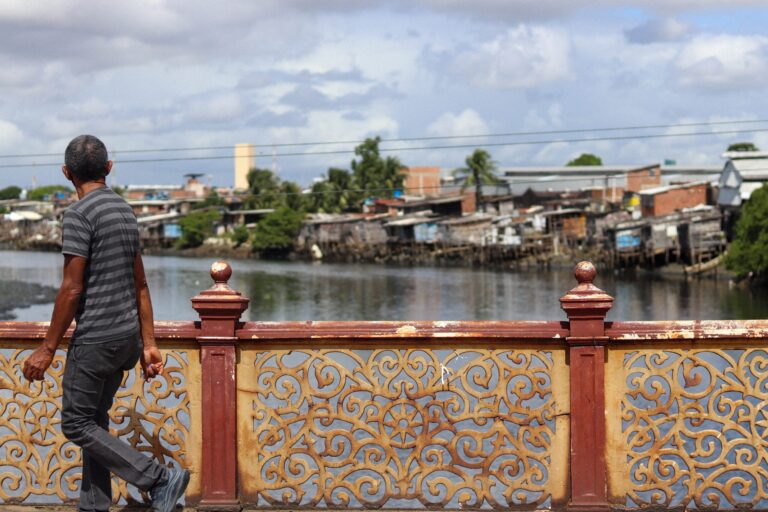Belém, Brazil’s largest Amazonian city, to host COP30
With Brazil serving as host of COP30, the chosen location for the annual climate summit will be one of the most unique in recent memory: Belém – the largest city in the Amazon in Brazil – will play host to the conference.
In the face of the climate emergency, the Amazon has enormous relevance at a global level due to the size of its biome, being the world’s largest tropical forest and a global climate regulator.
But the Amazon is also an urban place, home to 50 million people, with 72% living in cities.
These urban centers face unique challenges in public administration, services and connectivity, yet they are also decisive arenas where climate, energy, and land-use decisions are made.
Amazonian cities play a strategic role in protecting the biome. Safeguarding the Amazon means empowering its cities by understanding their unique contexts and needs. ICLEI has been working in this region to raise up the needs and opportunities of Amazon cities since 2019.
As the world turns its attention to Belém, ICLEI is raising up the voices of cities in the Amazon.
ICLEI’s history with Belém
Belém, the capital of the state of Pará, is its most populous city, with 1.39 million inhabitants. An ICLEI Member since 2022, the city is working with ICLEI to develop and promote public policies and actions for low-carbon development, climate adaptation and resilience, urban biodiversity, and the inclusion of vulnerable populations.
Belém is a leader that is advocating for cities in the Amazon region as vital participants in safeguarding the future of the Amazon forest. Belém’s 2050 goal is a low-carbon Belém, adapted and planned in connection with natural ecosystems, for the people, valuing popular participation in all its cultural diversity.
To help the city articulate this goal, ICLEI supported the Municipality of Belém in building the city’s Climate Compliance, a series of strategic studies that provided the foundation for the development of the Belém Local Climate Action Plan (PLAC-Belém). As, a result, Belém has developed one of the most comprehensive greenhouse-gas assessments in the Amazon.
- Greenhouse Gas Emissions Inventory (2023): This inventory outlines the city’s GHG emissions profile, identifying key sources and enabling the development of ambitious strategies to reduce emissions and mitigate the impacts of climate change locally.
- Climate Risk and Vulnerabilities Assessment (2025): Evaluates the impact of extreme events such as heavy rainfall, droughts, and floods, while identifying the most vulnerable areas. This tool is essential for helping the city understand and address the effects of climate change.
- Ecosystem Services Diagnosis (2025): This instrument takes into account the urban reality of Belém in its relationship with nature, both within the city and in its surrounding areas, serving as a fundamental input to guide Belém’s Climate Action Plan.
These studies were developed by ICLEI with support from the European Union (through the Global Covenant of Mayors for Climate & Energy), the International Union for Conservation of Nature (IUCN) via the Global EbA Fund, and the Inter-American Development Bank (IDB), which funds the development of the PLAC.
The importance of the Amazon biome and goals through 2050
The Amazon region is an essential ecosystem for the planet, as it is responsible for maintaining the local, regional and global climate. Brazil represents 60 per cent of the Amazon Basin, which encompasses more than half of the world’s remaining tropical rainforests and is home to the world’s greatest mega biodiversity.
In October 2023, Belém City Hall created the Municipal Climate Change Forum. Since then, the body has sought to encourage the adoption of policies aimed at protecting biodiversity and adapting to the effects of climate change. The Forum is made up of various municipal departments and federal and state bodies and meets every three months. Its functions include:
- Assessing the impact of climate change on the municipality
- Stimulating public debate on the issue
- Supporting actions to achieve the goals of the Paris Agreement and the Sustainable Development Goals of the UN’s 2030 Agenda
ICLEI is working with Belém to create opportunities for leadership
Launched by ICLEI in 2020, the Forum of Pan-Amazonian Cities (FCPA) aims to strengthen the representativeness and regional and international advocacy capacity of local governments in the Amazon region, promoting the exchange of experiences and decentralized regional cooperation, especially with regard to sustainable urban and territorial development initiatives.
The Forum of Amazon Cities (FCA) was launched in 2023 by mayors from across the Amazon, this platform is dedicated to shaping a new vision of sustainable development for the region. Funded by the IDB and supported by ICLEI and partners, Belém serves as the host city and primary coordinator, convening regular meetings, plenaries, and workshops, bringing input mainly on the opportunities for action by local governments in the Amazon towards COP30.
Another important initiative was Amazonia for the Climate – Green Finance for Local Governments, organized by ICLEI, the Institute for Climate and Society (iCS), the Sustainable Amazon Foundation and iCare. The partnership aimed to increase access to finance for local climate action in the Brazilian Legal Amazon region, contributing to the implementation of the Brazilian NDC and local and regional commitments. With guidance from experts, Belém structured a bankable climate project entitled “Environmental Protection Area – Murutucu Park”.
With ICLEI’s support, Belém has also participated in strategic initiatives, such as Brazil’s National Strategy of the Global Covenant of Mayors for Climate & Energy, as well as Nature-Based Cities: Biodiversity and Climate Resilience on Urban Development, Environmental Insights Explorer (EIE), and UrbanShift, expanding its multilateral engagement and access to green finance. In addition, the Young Climate Justice Ambassadors initiative has trained 1,000 children from municipal public schools on climate education and local action.
This blog was updated with new information on 29 September 2025.






